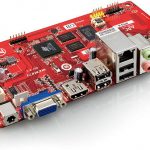IDC will finally count Windows tablets with iPads and Androids

Hopefully, Gartner and other analyst firms will show as much sense.
Windows tablets have gotten the shaft from IDC and other analyst firms for far too long. They count the devices as PCs, not tablets. Last year, after Gartner's tablet forecast failed to include Windows, several prominent bloggers fanned the flames of misinformation, wrongly concluding Microsoft's OS would have no share by 2015. Today, IDC issued a new forecast that still ignores Windows tablets, but changes are promised.
Write for BetaNews

We're hiring and taking on new freelancers and other writers. You could be among them. Paid and unpaid writing positions are available. Staff positions are paid BetaNews employees. Freelancers don't directly work for us but receive payment for their work. Unpaid writers typically receive compensation other ways, such as increasing their profile for personal or business gain.
BetaNews seeks a summer social media intern, staff writer and associate editor. These are paid, employee positions. We're also looking for new freelancers and other contributors. Writing is creative, rewarding and fulfilling work. Many of the best writers started out as news reporters. Few market sectors are as satisfying as technology. The pace of change makes for interesting topics, quelling the kind of boredom common to the other beats.
I'm still confused about Asus Open Cloud Computing

Computex is underway in Taipei, and Asus has a slew of mobile announcements we'll get to in other posts today. I'm scratching my head trying to grok the computer maker's cloud strategy, which looks good in this video but far removed from the reality I live in, or you. It's an idealized future of everywhere sync and help holograms that's more Star Trek than today's tech.
But the concept has meaning, and so there's no misunderstanding: Windows 8 plays an important role in Asus' cloud strategy. Microsoft issued Windows 8 Release Preview on May 31 and anticipates new PCs shipping with gold code for the holidays.
Techies, June will be the most amazing month EVER

Save your greenbacks now. During these thirty days you'll hear about lots of innovative and imitative products coming for the holidays. There's no coal in Santa's stocking this year, just too much tech to fit your gift list.
Not since the late 1990s, when seemingly every day some vendor announced a new PC that was ever-so-better than the one you bought the week before, is there so much new tech coming so close together. The cloud connected-device era ushers in a storm of tech. Save up now so you don't break the bank account or exceed credit card limits later.
Say, iPad idolaters, don't write the laptop's epitaph just yet

May you live in interesting times. It’s an ancient curse. Or is it a blessing? There are volumes devoted to that age-old issue. In my world, though, there’s nothing gray about this topic. I get paid to answer questions, so interesting times are a blessing. Straight up. When clients don’t have any questions, now that’s a curse.
These are blessed times we live in, my friends. At least it is in my world. It’s hard to believe that it’s only been two years since Apple sold the first iPad. The year before, the tech world marveled at the vitality of the PC. Incredibly, shipments grew in 2009, defying gravity at a time when the rest of the economy seemed to be in a free-fall. My, how things have changed.
Smartphones put privacy on the tsunami hazard map

Now, finally, the tide of public opinion on Internet privacy begins to flow in the other direction. Consumers are becoming more hesitant to share their data and are less tolerant when those with access to their data violate trust. That presents a tremendous threat to some of the titans of our day -- and an equally monstrous opportunity for others. Apple, Google, are you listening?
Honestly, I’m amazed that the issue was ever able to germinate and flower, particularly here in the United States, a country that distinguishes itself on the right to privacy. And a country that spent much of the last century wringing its collective hands over the Orwellian nightmare that awaited us down the road of technological advancement.
Raspberry Pi not enough for you? How about a $49 Android PC?

Taiwanese fabless semiconductor company Via Technologies on Tuesday unveiled its affordable, low power Android PC system, known simply as APC.
The $49 board uses the Neo-ITX form factor, which at 170 x 85 millimeters is the same length as Mini-ITX, but half as wide. It is powered by the VIA WonderMedia ARM 11 system on a chip, which is equipped with an 800MHz processor, 512 MB of DDR3 RAM, and has integrated GPU capable of video outputs up to 720p in resolution. It also has 2GB of NAND Flash storage, HDMI and VGA ports, four USB 2.0 ports, 1/8" headphone jack and mic input, microSD slot, and 10/100 Ethernet connectivity. The whole thing runs off of a 15 W power supply and is loaded with a version of Android 2.3 optimized for keyboard and mouse input.
Much like the wildly popular Raspberry Pi project PC which debuted last February, the APC is meant to be a "technology enabler" more than a powerhouse for computing. The board gives users with few resources the ability to build a cheap, usable computer without having to roll in the superfluous features associated with full-scale desktop OS computing.
Will you buy Samsung Galaxy S III?

Eleven days have passed since Samsung unveiled Galaxy S III, which goes on sale internationally on May 29. Galaxy S III and HTC One X are arguably the hottest Android smartphones currently available, thanks in part to quad-core HSPA+ models. But HTC One X is dual-core for LTE variants hitting these shores, subsidized from carriers; no final word yet on S3. I often ask buying questions like this one right away but waited to see what pricing would pop for Galaxy S III. Expansys-USA is taking preorders in pebble blue or white for $649.99. Pricing isn't available for 32GB or 64GB models.
I call out Expansys USA, because pricing is the best I've seen so far, and it's lower than expected. The $799.99 seen most elsewhere is more in line with unlocked Galaxy S II and Galaxy Nexus when they launched internationally. Through Amazon, Techno Trading House (a new reseller to me) lists the pebble blue model for $824, available June 2, although it's only $744 purchased direct. My simple question: Will you buy? Either unlocked for no-contract price or lower locked price from a carrier with contractual commitment -- the latter an option available in Europe before Stateside?
Microsoft, Barnes & Noble teach Apple and Amazon a lesson about educational ebooks

Nobody partners, or negotiates deals, like Microsoft. That's evident from today's stunning agreement with Barnes & Noble, which is sure to turn the ebook market on its head. The two will jointly invest in Newco, temporary name for ebook venture that incorporates B&N's digital and College business divisions. B&N gets partner in Microsoft, which invests $300 million, for 17.6 percent stake; both parties end ongoing patent disputes, largely related to Android; and Microsoft launches Windows 8 with native Nook Reader application. All around it's win-win, after losing a decade ago.
That's right, Barnes & Noble and Microsoft have been here before, in pioneering ebook ventures that failed. Both companies jumped on ebooks back when Amazon, which makes the popular Kindle, was still just a struggling Web 2.0 startup. Microsoft Reader led the first big ebook push at the turn of the century, and Barnes & Noble launched its original e-bookstore using the software. I bought my first ebooks there about 12 years ago. But by late 2003, it was over; Barnes & Noble gave up on ebooks -- a market later re-entered only after Amazon's Kindle success. Microsoft kept producing Reader software, but that's done, too, when the software retires on August 30.
Microsoft enterprise licensing changes favor Windows RT, put Android and iOS in their place

If you can't beat them, manage them. It's a strategy that has worked well for Microsoft in the past, and it is emerging as a key element in announcements last week about how Microsoft will license Windows 8 in all its variations, including the x86 consumer, Professional and Enterprise editions, the embedded Windows RT and the cloud-based Windows Intune.
While Microsoft's primary goal is to stop Apple's growth in the enterprise, which it will do by tilting licensing policies in favor of Windows tablets, the company has a Plan B that will help monetize Apple and Android devices in the enterprise through management.
PC shipments rally for big (cough, cough) 2% growth

Well, if fourth quarter PC shipments were bad (and they were), Q1 was not so bad, according to preliminary data Gartner and IDC released today. Woohoo, break out the sparklers, IDC put year-over-year growth at 2.3 percent, but only 1.9 percent by Gartner's estimates. Somebody cue up "Nearer My God To Thee", because the Titanic tragedy's centennial anniversary feels timely. Is the PC market suddenly sinking?
IDC already called 2011 the worst year for PCs since 2001, when recession robbed manufacturers and retailers of Christmas and set off a chain of profit warnings, including Apple and Microsoft. There are no profit warnings this time around, just plenty of misery. Well, unless your business is selling so-called Post-PC devices, like smartphones and tablets.
Touchscreens are our friends

When I was in college, a housemate and I inexplicably decided to include “Friend or Foe?” in the title of every paper we wrote one semester. I’m going to one-up him here, with two Friend-or-Foe headings in a single column. Take that, Eric.
Now for the first one. “Laptop Touchscreens: Friend or Foe?” This debate, which began a couple of years ago with the rise in popularity of all-in-one desktops with touch interfaces, is percolating again now that touch is migrating onto laptops.
Do you use a smartphone or tablet and watch TV?

I occasionally do. My wife does every day, multiple times, either using her Samsung Galaxy S II Skyrocket or Amazon Kindle. "In the US, 88 percent of tablet owners and 86 percent of smartphone owners said they used their device while watching TV at least once during a 30-day period", Nielsen says today. That's me. "For 45 percent of tablet tapping Americans, using their device while watching TV was a daily event". That's my better half. What about you?
I do tend to use my smartphone more often than a tablet while watching TV, that's to Shazam music -- something I frequently do everywhere. I was a deejay in an earlier life and compulsively search for good music. I'm not alone. Shazam audio QR codes appeared in Super Bowl ads for Best Buy, Pepsi and Toyota, among others. I see more QR codes in ads and TV shows every day. They're everywhere, and in some surprising places.
SMB cloud adoption begins to acclerate, study finds

Small and medium sized business are quickly moving to the cloud to reduce IT costs, a new study shows. The number of cloud services is expected to double over the next five years, and the number of small business using at least one cloud service will triple during that same period.
Cloud computing offers small business the opportunity to access the computing power of much larger corporations at a fraction of the cost. In fact, the survey shows that half of all SMBs see the cloud as becoming more important to their business.
The Cloud, Big Data and connected devices lift Intel semiconductors sales

For all the talk about the post-PC era and rise of alternate chip architectures, Intel defies gravity's pull. The microprocessing giant's dominance grows stronger, not lesser, which is strange juxtaposition to analyst predictions about media tablets and smartphones running ARM processors ending the PC's decades-long supremacy.
This week, iSuppli reports that Intel's share of the semiconductor market reached its highest level in a decade, 15.6 percent, largely based on its core chip business. "Intel in 2011 saw its revenue jump by 20.6 percent", Dale Ford, head of iSuppli Electronics and Semiconductor Research, says. "This outpaced every other semiconductor supplier in the Top 20 with the exception of Qualcomm Inc. and ON Semiconductor, both of which also saw exceptionally high levels of growth based on a combination of organic expansion and key acquisitions".
Recent Headlines
BetaNews, your source for breaking tech news, reviews, and in-depth reporting since 1998.
© 1998-2025 BetaNews, Inc. All Rights Reserved. About Us - Privacy Policy - Cookie Policy - Sitemap.